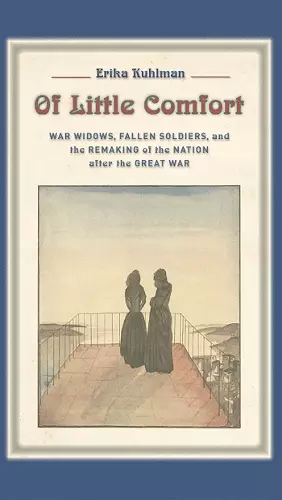Of Little Comfort
War Widows, Fallen Soldiers, and the Remaking of the Nation after the Great War
Format:Hardback
Publisher:New York University Press
Published:19th Mar '12
Currently unavailable, and unfortunately no date known when it will be back

Compares the ways in which German and American widows experienced their post-First World War status, and how that played into the cultures of mourning in their two nations
During and especially after World War I, the millions of black-clad widows on the streets of Europe’s cities were a constant reminder that war caused carnage on a vast scale. But widows were far more than just a reminder of the war’s fallen soldiers; they were literal and figurative actresses in how nations crafted their identities in the interwar era. In this extremely original study, Erika Kuhlman compares the ways in which German and American widows experienced their postwar status, and how that played into the cultures of mourning in their two nations: one defeated, the other victorious. Each nation used widows and war dead as symbols to either uphold their victory or disengage from their defeat, but Kuhlman, parsing both German and U.S. primary sources, compares widows’ lived experiences to public memory. For some widows, government compensation in the form of military-style awards sufficed. For others, their own deprivations, combined with those suffered by widows living in other nations, became the touchstone of a transnational awareness of the absurdity of war and the need to prevent it.
A much-needed account of an overlooked subject that offers a new perspective on the politics of gender in interwar Europe and the United States. * Journal of American History *
Kuhlman's fascinating study reminds us once again of how the Great War marked a new stage in the development of modern politics and the politicization of women's everyday lives. * H-Net Reviews *
Kuhlman compels readers to view women whose husbands were lost to them after the war as more than just victims...Her work adds new depth to understanding how, after the Great War, the often unheard and unnoticed inhabitants of nations carved a new place for themselves by challenging prevailing notions of their place within them. Highly recommended. * CHOICE *
I found this to be a fascinating historical study for the context it provided. It is a history of two societies, but primarily it is a story of women who are often overlooked when the larger stories of war are told. * SAGE Publications *
Eminently readable, Of Little Comfortis sure to become a standard text in university classes dealing with the Great War and military history, women's studies, and 20th century history. -- Herbert White * History in Review *
The book will be of value to scholars of transnationalism or students seeking to understand better the complexities of gender and memory post-World War I. -- Erika Quinn * The Historian *
This book by Erika Kuhlman, director of a woman's studies programme at Idaho State University, gives very helpful insights into the situation of women who had lost not only their fiances and husbands as breadwinners, but also some of their social reputation and emotional prospects in life. -- Sabine Kienitz * European History Quarterly *
This is a pathbreaking study, filling a major gap in our understanding of the way the wounds of war were inscribed on women's lives for decades after the Great War. Essential reading for all those drawn in increasing numbers to the Ur-catastrophe of the 20th century -- Jay Winter,Yale University
Moving seamlessly from comparative history to transnational history, this book offers a new model of scholarly analysis. It demonstrates the vitality of the new transnational movement in historical studies and shows why womens history is in the vanguard of that movement. -- Kathryn Kish Sklar,Distinguished Professor of History, State University of New York, Binghamton
In this insightful and well-researched study, Erika Kuhlman refocuses our analytical gaze at the Great War through the lens of widows views and experiences and by examining how nation-states attempted to use widows to militarize and nationalize the war and postwar years. Widows found empty promises, insufficient support and a less-than reciprocal citizenship from nations eager to cast them as symbols of national sacrifice and proper womanhood. Some cooperated with national plans but others challenged state-sponsored programs and definitions of their womanhood and citizenship. Some transcended the boundaries of the nation-state by identifying with other women as widows through transnational identities and activism. A particular strength of Kuhlmans work is her comparative analysis of widowhood and the Great War across national experiences and her identification of the ways that widowhood became a catalyst for some women to challenge nationalism and militarism, a process that continues today. -- Kimberly Jensen,Western Oregon University
Kuhlman uses letters, diaries, popular magazine articles, and correspondence between widows and their governments in the United States and Germany to examine the ways war widows coped with their roles after World War I... The book takes a deep look at the opinions of widows themselves, through their own words, and puts those experiences and struggles into the context of national efforts to define the war for both vanquished and victorious countries, such as using ceremonial mourning for soldiers and the plight of war widows to reinforce their national identity. * Washington State Magazine *
ISBN: 9780814748398
Dimensions: unknown
Weight: 431g
235 pages